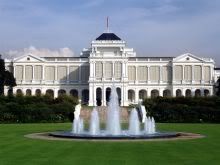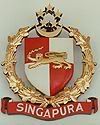Gerald Giam / Senior Writer
If the most important position in the world – the US Presidency – can be left to a democratic vote by citizens, I don’t see why Singapore cannot do the same.
 The debate about the relevance of the Elected Presidency (EP) came up again on October 21 in Parliament. With new framework to tap investment income from the reserves, the PAP government has given the Elected President additional duties; most significantly, approving the Finance Minister’s formula for determining the expected long-term real rates of return of Singapore’s reserves at the start of each financial year.
The debate about the relevance of the Elected Presidency (EP) came up again on October 21 in Parliament. With new framework to tap investment income from the reserves, the PAP government has given the Elected President additional duties; most significantly, approving the Finance Minister’s formula for determining the expected long-term real rates of return of Singapore’s reserves at the start of each financial year.
This formula is not made known to the public and could be changed each year. The only safeguard is the President and his Council of Advisors.
Prime Minister Lee Hsien Loong, on learning that the Workers’ Party (WP) voted in support of the constitutional amendment, took the opportunity to prod them to change their stand on the EP.
The WP’s original stand was made clear in the party’s Manifesto, released before the 2006 election. The WP opposes the EP because they feel it will take away the power of Parliament as the people’s representatives.
The EP was introduced by the PAP government ostensibly as a “second key” to the nation’s reserves and a safeguard against the irresponsible appointment of key civil servants.
The Elected President has much greater powers than most Singaporeans are probably aware of. According to the Singapore Constitution, the President may, at his discretion:
a. Appoint the Prime Minister (Article 25);
b. Veto the government’s choice of Chief Justice and Supreme Court judges, Attorney-General, Auditor-General, Accountant-General, Chief of Defence Force, Chiefs of the Air Force, Army and Navy, Commissioner of Police, Director of the Corrupt Practices Investigation Bureau (CPIB), statutory board chairmen and members, Chairman of the Public Service Commission (PSC), and many other key public service appointments (Article 22);
c. Veto the appointment or removal of directors or CEOs of Government companies, namely, Temasek Holdings, GIC and MND Holdings (Article 22C);
d. Veto a request to dissolve Parliament, which is a prerequisite for calling elections (Article 21);
e. Veto any proposed legislation that curtails his own powers (Article 22H);
f. Veto the budgets of statutory boards (Article 22B);
g. Approve the CPIB Director’s request to commence a corruption investigation against anyone, even if the Prime Minister refuses (Article 22G).
In the case of (b) and (c) above, the presidential veto can be overridden with a two-thirds majority vote by Parliament.
Given the powers of an Elected President, it is no wonder that WP chief Low Thia Khiang argued in Parliament that “the office of the Elected President could be potentially crippling for a non-PAP government”.
However this is the most likely reason why the PAP government introduced the EP in the first place. Surely they do not see a need to check themselves!
Furthermore, the very strict criteria for standing for election as President would, as Mr Low put it, mean presidents would likely come from the PAP Establishment.
Let’s examine the qualifications for Presidential candidates (Article 19):
a. Has been, for at least 3 years, a Minister, Chief Justice, Speaker, Attorney-General, Chairman of the PSC, Auditor-General, Accountant-General, Permanent Secretary, statutory board chairman or CEO, chairman or CEO of a $100 million dollar Singapore-registered company.
b. Satisfies the Presidential Elections Committee that he is a person of integrity, good character and reputation;
For (a) above, almost all qualified persons are current or former government appointees. And there are very few $100 million Singapore-registered companies which are not Government companies or their subsidiaries.
Who are the members of the Presidential Elections Committee (PEC)? Basically “three wise men”: The PSC chairman, chairman of the Accounting and Corporate Regulatory Authority (ACRA) and a member of the Presidential Council for Minority Rights. All these are government appointees (albeit some requiring presidential consent).
So, in summary, the field of candidates is limited to mainly government appointees. If that fails to throw up a candidate that satisfies the government, a government-appointed committee can make a subjective judgment call on who can run for president.
This played out almost exactly in the 2005 presidential election, when Andrew Kuan was disqualified by the PEC on grounds that as former Group Chief Financial Officer of the $1.9 billion JTC Corporation, his seniority and responsibility was “not comparable to those mentioned in the Constitution”.
Scenario: Opposition wins election
 Consider the following hypothetical scenario:
Consider the following hypothetical scenario:
An opposition coalition wins 51% of the seats in Parliament in the 2016 elections, way short of a two-thirds majority. The presidential election is not due until 2017. Therefore the Elected President is still the previous PAP government’s choice.
Come the August 2017 presidential election, the “three wise men” of the PEC are still in office, and cannot be removed without the approval of the sitting President. And so the field of candidates for the Presidency are still the PAP’s choices, and the choice of the President is a foregone conclusion at least until the 2023 presidential election.
This President exercises all the powers mentioned earlier, blocking appointments, including key security appointments of that of the Chief of Defence Force, Chief of Army and Commissioner of Police. Because the new government does not enjoy a two-thirds majority, it will be unable to override the President’s veto and will be forced to appoint the President’s preferred generals.
Even after 2023, seven years after the PAP has lost power, it may still be able to exercise its “third key”. Minister Mentor Lee Kuan Yew was quoted by Reuters on 16 September 2006, saying: “Without the Elected President and if there is a freak result, within two or three years, the army would have to come in and stop it.”
The most obvious implication of MM Lee’s statement is a threat of a military coup. But even without a coup, the presence of rebellious generals and police commissioners could be enough to destabilize the government and scare away investors.
Added to an uncooperative or adversarial Attorney-General, Chief Justice, Auditor-General and CPIB Director, the new government could be utterly crippled, not unlike the situation in Thailand right now.
For ordinary citizens who are not fully aware of the political manoeuvring behind the scenes, what they will see is a paralyzed government, incapable of getting anything done. They will yearn to “return to Egypt”, or the days when the PAP was in charge. By the 2021 or 2026 election, they will vote back the PAP into power and Singapore will be back to square one (less of course Lee Kuan Yew, for better or for worse).
Of course, the above scenario is an extreme example. If the PAP really had the country’s interests at heart, they would not paralyze the government after losing an election. But one can never predict how political parties will act, given that their foremost objective is to gain or retain power.
To keep or abolish?
 Therefore, I am inclined to agree with the WP that the EP, in its current setup, is unsatisfactory.
Therefore, I am inclined to agree with the WP that the EP, in its current setup, is unsatisfactory.
However, I will stop short of calling for its complete abolition. In principle, a directly elected Head of State would enhance democratic accountability of Parliament to the people. What I feel should be abolished is the artificially stringent qualification criteria for President.
The US Presidential candidate needs only to be born in the US, be at least 35 years old and have lived in the US for at least 14 of those years. In addition, there is a two-term limit and the Senate (the upper house of Parliament) can disqualify impeached and convicted individuals from running for President.
If the most important position in the world can be left to a democratic vote by citizens, I don’t see why Singapore cannot do the same. In any case, the Elected President maintains only custodial, not executive powers.
Therefore I would like to suggest that we keep the EP, but the qualification criteria should include:
a. Born or naturalised citizen;
b. Lived in Singapore for at least 35 years;
c. Has not held the office of President for more than one term;
d. Is subject to the qualifications as a Member of Parliament (Article 44)
e. Is not subject to any of the disqualifications as a Member of Parliament (Article 45);
f. Has not been a member of any political party for three years leading to the date of his nomination for election.
My main rationale for (f) is to try to minimize the number of politically-aligned candidates, since the President is expected to make decisions without favouring any political party.
I have deliberately excluded any criteria for financial knowledge, even though a large portion of the President’s duties pertain to financial oversight. I would expect the candidates themselves to prove to the electorate their financial competence, and scrutinize each others’ records.
In essence, this relatively thin criteria is not to lower the bar, but to subject the candidates to the electorate’s scrutiny, instead of members of the Establishment. With an educated and world-aware electorate, I trust the “wisdom of crowds” to make the right decision.
This proposal is a work in progress. I hope readers can discuss this and offer counter-suggestions. If there is sufficient interest among readers, I will write another article to discuss my rationale for the other proposed criteria, and possibly include amendments based on feedback.
———————
